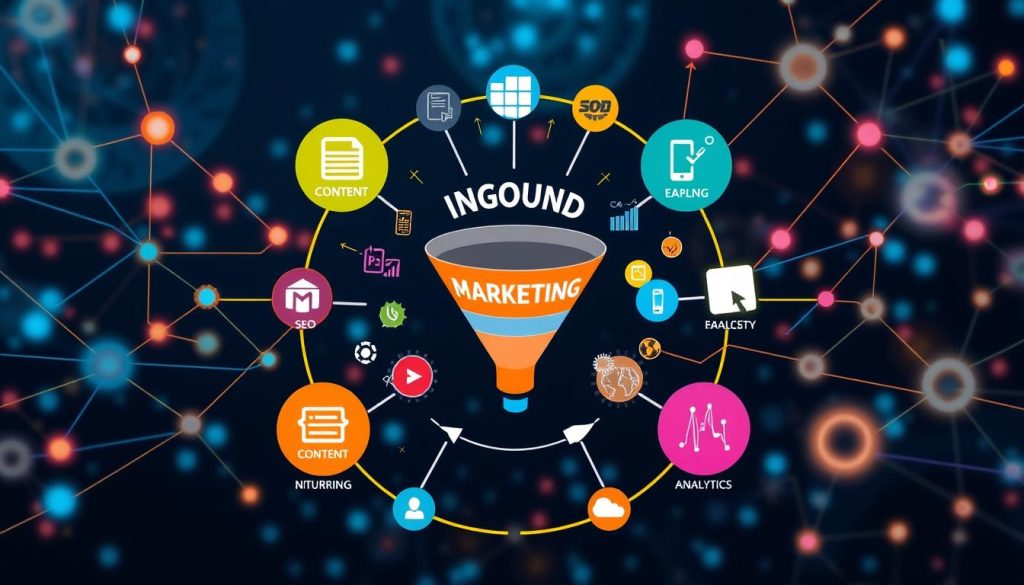Lead generation specialists are vital in modern business. They identify and nurture high-quality leads for sales and marketing teams. Their work is crucial for driving revenue and expanding the customer base.
These professionals are experts in creating targeted campaigns. They attract, engage, and convert potential customers effectively. Their skills help transform website visitors into qualified leads for sales outreach.
Lead generation specialists navigate the complex world of buyer behavior. They help organizations adapt to the changing digital landscape. Their unique abilities set them apart in the field.
Key Takeaways
- Lead generation specialists play a critical role in driving business growth through strategic prospecting and lead qualification.
- They are responsible for identifying, engaging, and converting potential customers into sales-ready leads.
- Lead generation specialists leverage a wide range of marketing channels and techniques to attract and qualify leads.
- Their expertise in navigating the complex buyer’s journey is essential for creating effective lead generation campaigns.
- Successful lead generation specialists possess a unique blend of marketing, sales, and analytical skills.
Understanding the Role of a Lead Generation Specialist
A lead generation specialist’s main job is to get qualified leads for their company. They use special tactics to find, nurture, and turn potential customers into real ones. This role mixes lead generation tactics, lead management, and inbound marketing strategies.
Key Responsibilities and Core Functions
Lead generation specialists have several key duties:
- Developing and implementing targeted marketing campaigns to attract and capture qualified leads
- Collaborating with sales teams to ensure a seamless handoff of leads and optimize the sales funnel
- Continuously analyzing and optimizing lead generation efforts to improve conversion rates
- Maintaining accurate records and reporting on lead generation metrics to inform data-driven decision-making
Essential Skills Required
To do well, lead generation specialists need various skills:
- Strong analytical and problem-solving abilities to identify and address bottlenecks in the lead generation process
- Excellent communication and interpersonal skills to effectively collaborate with cross-functional teams
- Creativity and strategic thinking to develop innovative lead generation campaigns
- Proficiency in using lead management and inbound marketing tools and technologies
Daily Activities Overview
A lead generation specialist’s typical day might include:
- Conducting market research and competitor analysis to identify new lead generation tactics
- Creating and executing targeted email, social media, and content marketing campaigns
- Continuously monitoring and optimizing lead generation performance through data analysis
- Collaborating with sales teams to qualify and nurture leads, ensuring a seamless handoff
- Staying up-to-date with industry trends and best practices in lead generation and lead management
Knowing what lead generation specialists do helps companies use their skills better. This can lead to more business growth and new customers.

The Evolution of Lead Generation in Modern Business
B2B lead generation has transformed rapidly in recent years. Technology advancements and changing consumer behaviors drive this evolution. Traditional outbound marketing tactics are no longer the primary lead generation methods.
Inbound marketing strategies have risen to prominence in lead generation. Businesses now create valuable content to attract their target audience. This approach replaces interrupting potential clients with promotional messages.
Content marketing, social media outreach, and search engine optimization (SEO) are now popular lead generation tactics. These methods engage audiences more effectively than traditional approaches.
The B2B landscape has become increasingly data-driven. Businesses use advanced analytics and lead scoring models to identify high-quality leads. These tools help nurture potential customers more effectively.
Lead generation specialists navigate this evolving ecosystem skillfully. They combine outbound and inbound tactics to generate, qualify, and convert leads. Their role is crucial in today’s competitive business environment.
Staying ahead of the curve is vital for lead generation specialists. They must adapt their strategies to meet changing audience needs. Embracing new technologies and data-driven insights is key to success.
Innovative lead generation tactics drive sustainable growth. By staying current, businesses can thrive in the dynamic world of B2B lead generation.
| Traditional Lead Generation | Modern Lead Generation |
|---|---|
|
|
“The future of lead generation lies in the seamless integration of data-driven insights, personalized content, and automated workflows.”
What Does a Lead Generation Specialist Do: A Comprehensive Overview
A lead generation specialist finds and nurtures potential customers interested in a company’s products or services. This role involves strategic planning, performance tracking, and teamwork to boost business growth and revenue.
Strategic Planning and Implementation
Lead generation specialists develop and execute marketing strategies to capture qualified leads. They identify target audiences, create compelling value propositions, and use various tactics to attract potential customers.
These efforts align with the company’s goals to ensure lead generation activities contribute to overall success. The specialist combines inbound and outbound methods to reach potential clients effectively.
Performance Tracking and Analytics
Lead generation specialists closely monitor key metrics to measure campaign success. They track lead volume, conversion rates, and pipeline velocity using analytics tools and reporting.
This data-driven approach helps optimize strategies and improve targeting. By analyzing performance, specialists can enhance the efficiency of the lead generation process.
Cross-functional Collaboration
The lead generation specialist works with sales, marketing, and customer success teams to manage leads effectively. This collaboration ensures qualified leads are properly nurtured and supported throughout their journey.
By partnering with different departments, the specialist creates a seamless approach to lead management. This teamwork is crucial for converting leads into loyal customers.

“The key to success in lead generation is the ability to adapt and evolve alongside the ever-changing marketing landscape. A flexible, data-driven, and collaborative approach is essential for driving sustainable business growth.”
Mastering Inbound Marketing Strategies
Inbound marketing strategies are powerful tools for attracting potential customers. Inbound marketing creates valuable content to draw prospects to your business. This approach differs from traditional outbound tactics that interrupt customers.
Content marketing is a core inbound strategy. It positions your brand as an industry authority. Informative content can provide immense value to your target audience.
This includes blog posts, videos, webinars, e-books, and social media content. These address the pain points and interests of potential customers.
Search engine optimization (SEO) is crucial for inbound marketing. It increases your visibility in search results. SEO attracts organic traffic through website and content optimization.
On-page optimization, link building, and content strategy are key SEO components. They align with your audience’s search intent.
Social media platforms play a vital role in inbound marketing. LinkedIn, Twitter, and Instagram help engage your audience. You can share content and build relationships with potential customers.
This lead generation tactic nurtures leads effectively. It positions your brand as a trusted industry resource.
Mastering inbound marketing requires a holistic approach. Integrate these strategies seamlessly. Measure their effectiveness continuously to create a sustainable lead pipeline.

| Inbound Marketing Strategies | Key Benefits |
|---|---|
| Content Marketing | Establishes thought leadership, attracts targeted traffic, and nurtures leads. |
| Search Engine Optimization (SEO) | Improves visibility in search results, drives organic traffic, and enhances lead quality. |
| Social Media Engagement | Builds brand awareness, fosters relationships with prospects, and generates qualified leads. |
Outbound Marketing Techniques and Best Practices
Outbound marketing is vital for connecting with potential customers. It complements inbound strategies in lead generation. Mastering various outbound techniques helps identify and engage high-quality b2b lead generation prospects.
Cold Calling and Email Campaigns
Cold calling and email outreach are powerful outbound marketing tools. They help build brand awareness and start valuable conversations. Craft compelling, personalized messages that address your audience’s unique needs.
Social Selling Approaches
Using platforms like LinkedIn can be an impactful lead generation tactic. Engage with your network and share valuable content. Participate in relevant discussions to become a thought leader and build trust.
Direct Marketing Methods
Targeted direct mail campaigns and personalized outreach can be highly effective. Use data-driven insights and creative messaging to stand out. These methods help generate qualified leads in a crowded market.
Successful outbound marketing balances strategic planning and data-driven execution. Understanding your target audience is crucial. Master these techniques to boost your lead generation efforts and drive business growth.

Lead Qualification and Scoring Systems
Lead qualification and scoring are vital in lead generation. Specialists evaluate potential customers using deep business and audience knowledge. They prioritize leads to focus on the most promising opportunities.
Clear criteria help assess lead quality. Factors include budget, decision-making power, and product interest. A scoring system helps identify valuable qualified leads efficiently.
Point-based systems are popular for lead scoring. Leads get numerical values based on set attributes. Higher scores suggest better conversion chances.
This approach allows sales and marketing teams to align on evaluation criteria. They can work together to nurture leads effectively.
A good lead management system offers more than lead identification. It provides insights into audience preferences and behaviors. This helps specialists optimize strategies and personalize engagement.
| Lead Qualification Criteria | Lead Scoring Model |
|---|---|
|
|
Strategic lead qualification and scoring boost business results. They help specialists focus on promising leads. This approach ensures consistent and effective lead generation efforts.
Digital Tools and Technologies for Lead Generation
Lead generation specialists have powerful tools to boost their work. These digital solutions transform how businesses approach lead generation and management. CRM platforms, marketing automation, and analytics tools are key players.
CRM Platforms and Integration
CRM platforms are vital for modern lead generation tactics. They centralize customer data and enable seamless communication. CRM systems integrate with other tools to create a unified workflow.
This integration optimizes the entire lead lifecycle. It allows for data-driven decisions and task automation.
Marketing Automation Software
Marketing automation is crucial for lead generation specialists. It handles repetitive tasks like email campaigns and lead scoring. This allows teams to focus on strategic initiatives.
These platforms personalize outreach and optimize campaigns. They also track performance with greater precision.
Analytics and Reporting Tools
Data-driven decisions are key to effective lead generation strategies. Analytics tools track performance indicators and measure campaign success. They provide insights into target audiences.
From web analytics to lead source attribution, these tools are invaluable. They help teams refine tactics and ensure higher ROI.
| Digital Tool | Key Capabilities | Benefits for Lead Generation |
|---|---|---|
| Salesforce CRM | – Customer data management – Automated lead scoring – Pipeline tracking |
– Centralized lead data – Streamlined lead management – Improved sales and marketing alignment |
| HubSpot Marketing Hub | – Email marketing automation – Lead nurturing workflows – Web analytics and reporting |
– Personalized lead outreach – Optimized lead conversion rates – Data-driven lead generation strategies |
| Google Analytics | – Website traffic analysis – Channel performance tracking – Conversion rate optimization |
– Insights into lead sources – Identification of high-performing channels – Continuous improvement of lead generation tactics |
These digital tools empower lead generation specialists to streamline workflows. They enhance targeting and personalization efforts. The result is data-driven decisions that drive sustainable growth for organizations.
Building and Managing Lead Nurturing Campaigns
Lead nurturing is crucial in guiding prospects through the sales funnel. It transforms qualified leads into loyal customers. Lead generation specialists play a key role in this process.
Effective strategies use personalization and multi-channel engagement. Specialists create tailored content and timely follow-ups. This builds trust and loyalty with leads.
Nurturing methods include email sequences and social media interactions. Targeted webinars and downloadable resources are also used. These tools address pain points and create sales-ready opportunities.
Metrics and analytics are vital in managing nurturing campaigns. Specialists track key performance indicators. These include email open rates and click-through rates.
They also monitor lead-to-customer conversion ratios. This data-driven approach helps optimize strategies. It refines messaging and improves resource allocation.




